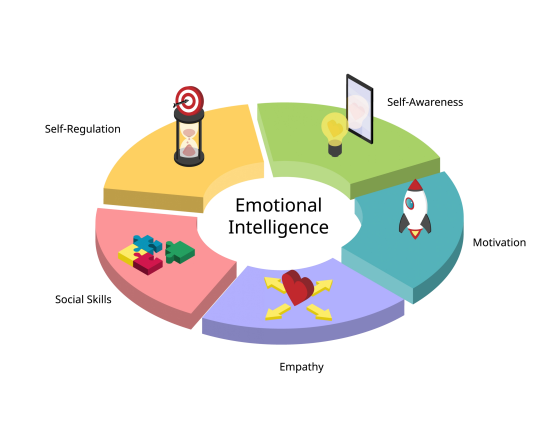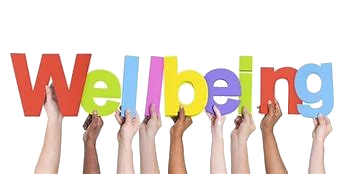Emotional Well-Being and Contentment
Contentment, Identity and Personality.
Concerns the ability to know your own mind, body and soul. Pragmatically this means to reflect on our feelings, and to recognise, communicate, respond to, and understand feelings.
We all have a sense of feeling that we are born with, and we develop an understanding of ourselves emotionally through our primary relationships we had with our early family members, neighbours, teachers, church members, and wider cultural influencers like the internet and social media.
As we grow up, we make choices about how to belong. Collectively our choices with different groups of people and environments may help us grow and reach our potential and may also hold us back. What worked when we were a child no longer works as an adult.
Some of our early learned ways might be to suppress our feelings and to attribute negative thinking to a feeling. Your parents might have frowned upon you crying or getting angry or been pleased with you when you were able to ‘put a brave face on’ or ‘be a man!’. This can negatively distort our sense of self and others and be life limiting.
These ways of adapting to early environments are now wired into how you react to everyday life. So, when you successfully suppress your anger or sadness or fear over and over again, it can lead to them bubbling up as anxiety and ultimately shutting down completely as depression.
Emotional and Personal Development
Being in charge of your own emotional well-being is a big predictor of success in one’s work, rest, play and relationships.
People can use their feeling sense to improve mental health, reach goals, and develop fulfilling relationships. According to a 2018 report of North Americans, people with a high EQ (a measure of emotional awareness) are 8 times as likely to have a high quality of life as those with lower scores. A higher EQ can improve lifelong physical and mental health even more than academic ability.
Research also suggests EQ is more important than IQ for succeeding in the workplace. Employees with high EQ are more likely to display leadership skills and high business performance. Managers with a high EQ are more likely to retain employees long-term.

Clues that therapy can help you
A negative and distorted sense of our feelings and those of others can result in life difficulties:
- Forming healthy friendships and relationships.
- Working as a team in school or on a job.
- Communicating their needs and desires in a productive manner.
- Recognizing and regulating their own emotions.
- Avoiding regretful actions or words spoken in anger.
These difficulties can cause a person to become anxious, anguished, isolated and lonely. Isolation, in turn, can prevent a person from developing social skills on their own. If you are suffering, then help is on hand through engagement in a relational talking therapy that will help you by identifying relational gaps through curiosity, empathy and challenge. It is a process of grieving, healing and new emotionally supportive choices.
Like any other skill, emotional intelligence can be improved through effort and practice. If you want to learn a bit more, check out my blog page.

A Therapeutic Relationship Will Help With:
Self-awareness
A healthy sense of self develops within a positively affirming parental relationship. Being bathed in positive unconditional and positive conditional love with parents and influential adults will help the person develop a strong sense of self-efficacy. This helps them to view challenges positively, with the internal and external resources they need and to understand setbacks to move forward. They are aware of their flaws and abilities and choose to utilize these qualities to the best of their ability. Someone with a weak sense of self-efficacy finds this much harder and may avoid challenges and quickly feels discouraged by setbacks.
The pre-pubescent child becomes aware of all the main feelings and develops the more complex feelings of guilt, shame and pride associated with meaning about themself and the other.
By puberty social interactions are the focus in the final development of self-awareness in adolescence and encompass self-concept, self-image, and self-consciousness. Teens with a good self-awareness and self-efficacy are more able to manage anger.
Self-regulation
Is the mindful reflection to emotionally self-sooth and head-off moods or emotions from causing self-limiting impulsive behaviour. This is more available to the teen with a high degree of self-awareness.
Counselling in adolescence can improve self-awareness and anger management thus reducing aggression. Reflection slows down angry impulses through deeper thinking and opens alternatives and emotional regulation. Adults that have experienced too much negative unconditional or negative conditional interactions in their childhood will have difficulties managing anger and can act-out their anger on others or act-in their anger with others.
Internal motivation
Knowing your own mind, body and soul, in what limits you and what helps you,
is your navigation system to emotional health. Using this trusted sense to drive your choices is
grounded, stable and adult and is based in our optimism, curiosity, purpose, and values.
Empathy
Understanding the feelings and emotions of others and using this knowledge to respond to people based on their emotional state. Understanding always engages whilst disagreement is polarising and isolating. Engagement promotes deep understanding and a powerful connection of solidarity. Through listening to their perspective, you can empathetically understand what is emotionally at stake at the core of the other persons truth; their needs and intentions, and through this slower, thoughtful compassionate understanding we can find a collaborative pathway together. All of which promotes mutuality and growth for both.
Social skills
Using one’s emotional sense to establish strong relationships and belong within a group. This is essential to a person’s sense of belonging, acceptance and security and culturally is the fertile ground for creativity and our personal development needed as life proceeds. There are many social skills needed that can be heightened through therapy including use of intuition, observation, curiosity and creating a dialogue of curiosity to gain an understanding of intentions, needs and desires.

